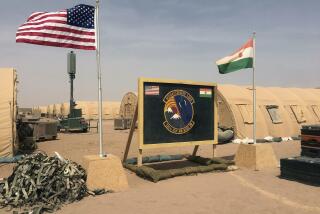GIs Put on Alert for Relief Airdrop in Zaire
- Share via
WASHINGTON — The United States put troops on alert Wednesday for participation in a potential airdrop of relief supplies for hundreds of thousands of Rwandan refugees in Zaire.
The airdrop proposal was put forth by Canada as part of a broader Canadian plan that also includes the establishment of a multinational base of operations in Central Africa to coordinate relief efforts.
The Clinton administration endorsed the base concept but stopped short of supporting airdrops, saying consultations with Canada are needed.
Some U.S. officials have serious reservations about airdrops because the supplies might fall into the hands of disreputable Rwandan Hutu militias or inadvertently kill or maim innocent refugees.
Countries willing to donate troops or money to the international relief effort had debated the issue without making a decision ever since the crisis took a dramatic turn 13 days ago with the sudden repatriation of about 600,000 refugees to Rwanda.
Some governments had counseled that the multinational force is no longer necessary because of the mass repatriation. Others disagreed, pointing to the continued presence of hundreds of thousands of additional refugees in Zaire.
Tens of thousands of refugees, many of them weak and ill, poured out of eastern Zairian forests and into filthy, disease-ridden refugee camps Wednesday. More than 15,000 refugees gathered in a dirty camp in Minova, a city on the shore of Lake Kivu at Zaire’s border with Rwanda.
Meanwhile, the Boston Globe reported Wednesday that the commander of a U.N. force in Rwanda told his superiors in January 1994 of a plan by Rwandan militias to massacre ethnic Tutsis, but the full report never made it to the Security Council.
Three months later, Hutu-led Rwandan troops and militias launched a genocidal campaign that killed more than 800,000 people, mainly Tutsis, and forced more than 1 million refugees to flee to surrounding nations.
The report on the planned massacre was given to U.S., French and Belgian ambassadors in the Rwandan capital of Kigali, but never made it to the U.N. Security Council in New York, U.N. spokeswoman Sylvana Foa said.
Foa said that full details of the report were withheld from the Security Council because of fears that a leak would endanger the informant. She said the U.N. also feared that if word of the report leaked out, it might have encouraged Hutu extremists to launch attacks on Tutsis immediately.
More to Read
Sign up for Essential California
The most important California stories and recommendations in your inbox every morning.
You may occasionally receive promotional content from the Los Angeles Times.













